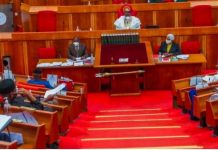The Under-Secretary of the Dicastery for Laity, Family and Life, moderates a meeting on surrogacy at the United Nations in Geneva focusing on the need for international planning to protect women and children from all forms of exploitation.
Surrogacy represents “a serious violation of the dignity and rights of women and children”, and the international community “must therefore feel called upon to reflect on the urgency of placing an absolute ban on all forms of surrogacy,” as Pope Francis called for in his speech to the Diplomatic Corps in January this year. In fact, consensus around “a strongly negative view of surrogacy” is emerging globally, “even from different political, ethical and religious positions”. These are the conclusions proposed by Gabriella Gambino, Under-Secretary of the Dicastery for Laity, Family and Life, who moderated the dicussions during the event on 18 June at the Palais des Nations in Geneva, Switzerland. The one day meeting had the title “At what price? Towards the abolition of surrogacy: preventing the exploitation and commodification of women and children”, and was organised by the Permanent Mission of the Holy See to the United Nations in Geneva and the “Caritas in Veritate” Foundation.
‘Procreative tourism’
The aim of the meeting, Gabriella Gambino explained in her introduction, was “to reflect on the urgency of an international response to the phenomenon of surrogacy.” Aware of the fact that ‘procreative tourism’ generated by the divergence of states’ regulations on surrogacy “is still the cause of the transnational exploitation of women and children through this practice,” she said it is necessary “to deepen the possibility of a common commitment to ensure the universal safeguarding of the dignity and fundamental human rights of those involved.”
Right to dignity
The Vatican Under-Secretary quoted the recent declaration Dignitas infinita of the Holy See’s Dicastery for the Doctrine of the Faith (April 2024), where it emphasises that every child has the right “to have a fully human origin and […] to receive the gift of life that manifests both the dignity of the giver and that of the receiver.” She pointed out that “not all methods of reproduction are lawful, and there is no strictly legal ‘right to a child’ capable of justifying any procreative practice.” She then recalled the problems associated with surrogacy, from “making the birth a depersonalised procedure” to the “commodification and exploitation of women and children” on the one hand. It is also “a form of arranging fundamental human relationships, which will forever impact the identity and life of the woman and of the child.”
Expert input
After Gabriella Gambino’s introduction, Eugenia Roccella, Italy’s Minister for Family, Birth Rate and Equal Opportunities, took the floor to explore the issue of surrogacy from the perspective of Italian legislation. Olivia Maurel, spokesperson for Casablanca Declaration and leader of the campaign for the universal abolition of surrogacy, was conceived and born in Kentucky, USA, through a surrogate mother, then spoke, analysing the issue from the perspective of children’s rights. The third speaker was journalist and author Eva Maria Bachinger, who co-founded the ‘Stop Surrogacy’ initiative in Vienna in 2015 and is the author of three books on this topic, assessing the issue of surrogacy from the perspective of women’s rights. And finally, Bettina Roska, legal officer of ADF International in Geneva, Switzerland, analysed the topic in its legal dimensions by showing the international legal landscape and highlighting gaps and challenges.
Source:Vatican News






























